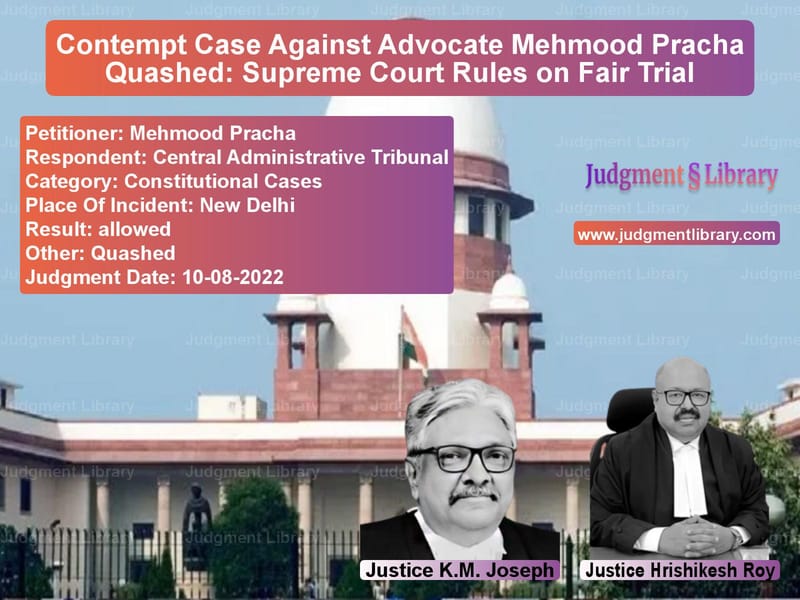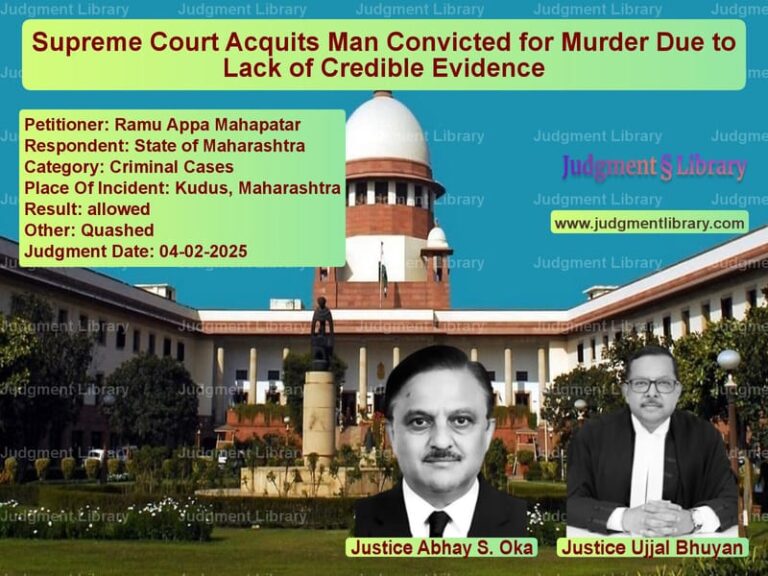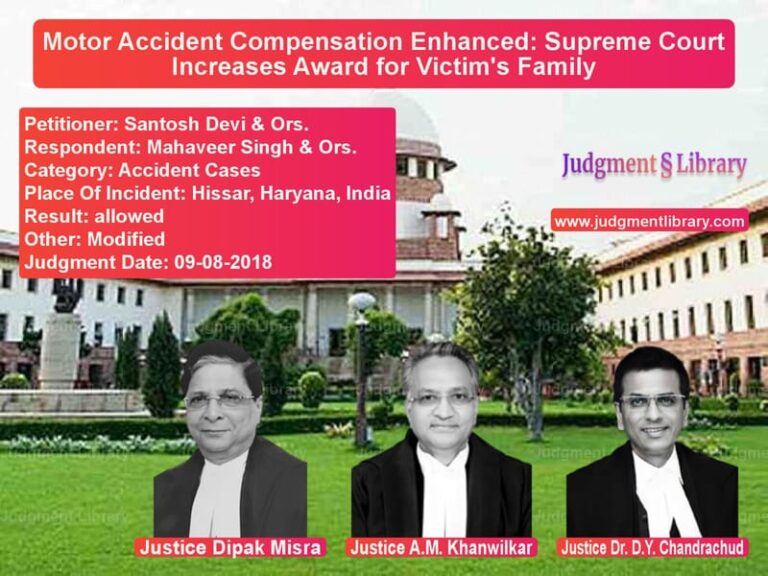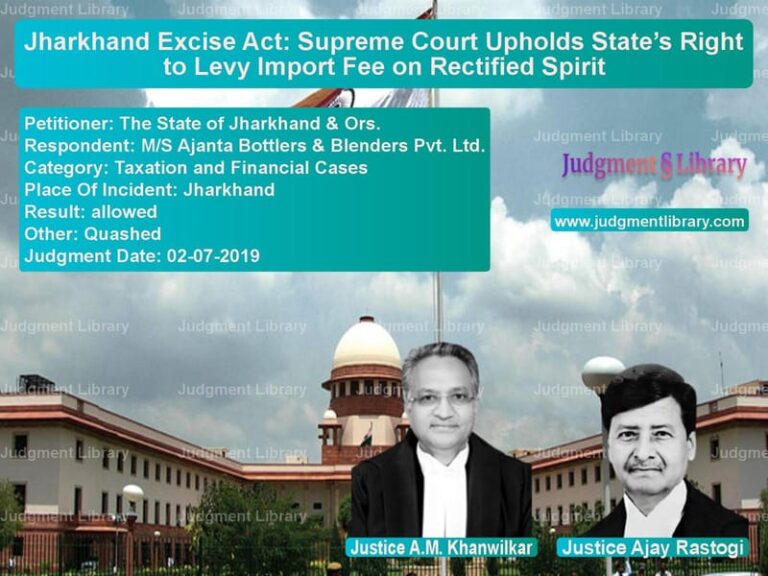Contempt Case Against Advocate Mehmood Pracha Quashed: Supreme Court Rules on Fair Trial
The case of Mehmood Pracha vs. Central Administrative Tribunal revolved around contempt of court proceedings initiated against advocate Mehmood Pracha by the Central Administrative Tribunal (CAT), Principal Bench. The Supreme Court was called upon to determine whether the tribunal erred in convicting him under the Contempt of Courts Act, 1971, without conducting a fair trial.
Background of the Case
The contempt proceedings arose from an incident on February 8, 2019, during a hearing in the Central Administrative Tribunal. Mehmood Pracha, representing an applicant, allegedly made disrespectful statements and conducted himself in a manner deemed contemptuous by the tribunal. The Tribunal found him guilty of contempt but chose to let him off with a warning, forwarding a copy of the order to the Bar Council of India and the Delhi State Bar Council for further action.
Challenging this decision, Mehmood Pracha approached the Supreme Court, arguing that he was denied a fair trial as required under the Contempt of Courts Act, 1971, and the Contempt of Courts (CAT) Rules, 1992.
Legal Issues Before the Supreme Court
The Supreme Court had to decide:
- Whether the contempt proceedings initiated by the Central Administrative Tribunal complied with the legal procedures established under the Contempt of Courts Act, 1971.
- Whether Mehmood Pracha was denied a fair trial before being convicted of contempt.
- Whether the tribunal had the authority to convict and warn him without providing him an opportunity to defend himself.
Arguments Presented
Petitioner (Mehmood Pracha) Arguments
- Pracha argued that he was not given a fair opportunity to defend himself against the charges.
- He contended that the Tribunal did not conduct a trial as required by law and instead delivered its verdict summarily.
- He pointed out that Section 14 of the Contempt of Courts Act, 1971, mandates that even in cases of contempt in the face of the court, the accused must be given an opportunity to present evidence and defend themselves.
- He further argued that the proceedings were biased and aimed at targeting him personally.
Respondent (Central Administrative Tribunal) Arguments
- The Tribunal argued that Pracha’s conduct in open court was disruptive and amounted to criminal contempt.
- It contended that under Section 14 of the Contempt of Courts Act, 1971, contempt committed in the presence of the court does not necessarily require a detailed trial.
- The Tribunal relied on the precedent set in Leila David vs. State of Maharashtra, where the Supreme Court had upheld summary conviction in cases of contempt committed in the face of the court.
- It justified its decision to warn him instead of imposing a harsher penalty, suggesting that the judgment was lenient and should not be interfered with.
Supreme Court’s Analysis and Judgment
The Supreme Court examined the procedural lapses in the contempt proceedings against Pracha and emphasized the importance of adhering to due process.
Key Observations by the Supreme Court
- The Court noted that the Tribunal failed to follow the trial procedure as mandated by the Contempt of Courts Act, 1971.
- It found that once Pracha had pleaded not guilty, the Tribunal was required to conduct a trial and allow him to present evidence, which it did not do.
- The Court clarified that even in cases of contempt committed in the face of the court, the accused has the right to be heard and to present a defense.
- It distinguished this case from Leila David, where the contemnors had repeatedly engaged in misconduct and refused to retract their statements.
Key Court Statement
“The appellant must succeed. We are allowing this appeal only on the ground that the procedure under the Act and the Rules relating to adducing of evidence when there is a denial of the charge was not followed. We would undoubtedly have had no reservation in upholding the order if there was evidence to support the charge as framed against the appellant.”
Final Judgment
- The Supreme Court quashed the contempt conviction against Mehmood Pracha.
- It ruled that the Tribunal’s failure to conduct a fair trial rendered the conviction legally unsustainable.
- The Court also set aside the direction to forward the case to the Bar Council of India.
- The appeal was allowed, and the contempt order was nullified.
Implications of the Judgment
This ruling has significant implications for contempt proceedings in India:
- It reinforces that due process must be followed in all contempt cases, including those involving direct contempt in the face of the court.
- It clarifies that tribunals do not have unrestricted powers to summarily convict individuals without a fair trial.
- It ensures that advocates and litigants are given a fair opportunity to defend themselves before being held guilty of contempt.
- It prevents misuse of contempt powers by ensuring that they are exercised in a legally sound and procedurally correct manner.
Conclusion
The Supreme Court’s decision in this case serves as a strong reminder that procedural fairness is a fundamental requirement in contempt proceedings. By quashing the conviction of Mehmood Pracha, the ruling reinforces the importance of due process, ensuring that no one is punished for contempt without a fair opportunity to defend themselves. The judgment safeguards the rights of legal professionals while maintaining the dignity and decorum of the judicial system.
Petitioner Name: Mehmood Pracha.Respondent Name: Central Administrative Tribunal.Judgment By: Justice K.M. Joseph, Justice Hrishikesh Roy.Place Of Incident: New Delhi.Judgment Date: 10-08-2022.
Don’t miss out on the full details! Download the complete judgment in PDF format below and gain valuable insights instantly!
Download Judgment: mehmood-pracha-vs-central-administrati-supreme-court-of-india-judgment-dated-10-08-2022.pdf
Directly Download Judgment: Directly download this Judgment
See all petitions in Fundamental Rights
See all petitions in Public Interest Litigation
See all petitions in Contempt Of Court cases
See all petitions in Judgment by K.M. Joseph
See all petitions in Judgment by Hrishikesh Roy
See all petitions in allowed
See all petitions in Quashed
See all petitions in supreme court of India judgments August 2022
See all petitions in 2022 judgments
See all posts in Constitutional Cases Category
See all allowed petitions in Constitutional Cases Category
See all Dismissed petitions in Constitutional Cases Category
See all partially allowed petitions in Constitutional Cases Category







